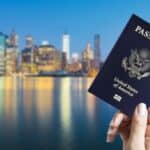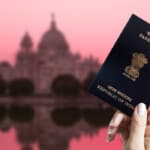The most powerful passports are mainly ranked according to how many countries or territories the passport holder has visa-free access to or where visa-on-arrival privilege is afforded. For instance, according to the Global Passport Index’s research, Sweden was placed at the top of the list in 2025 not only for its visa-free access but also for ranking 1st in Quality of Life and 11th in Investment.
To go beyond the obvious, Global Citizen Solutions has adopted a pioneering approach that goes beyond the mere global travel appeal of a country’s passport. When people are selecting where they’ll be getting second citizenship, many are also looking at quality of life for their family and, the country’s future potential for growth and overall economic prowess.
In this article we’ll count down the top 20 strongest passports in the world for 2025 and then dive deeper into what each passport ranking factor in the Global Passport Index means.
Top 20 Most Powerful Passports
Global Citizen Solutions developed a new passport ranking methodology to measure the overall attractiveness of a country for relocation, investment, economic mobility, or dual citizenship purposes.
We collaborated with scholars who worked with UNESCO, analyzing quantitative data from international institutions, including the World Bank, World Economic Forum, and the Sustainable Development Report.
When reflecting on 2025‘s passport ranking results Laura Madrid, Research Lead for the Global Intelligence Unit, notes that, “… because GPI incorporates quality of life as a key component in its methodology, all of the top 10 passports in our ranking belong to European countries, highlighting how our indicators go beyond mobility and reflect the overall value of holding a particular passport.”
Rank | Country | Enhanced Mobility Index | Investment Index | Quality of Life index | |
1 | Sweden | 8 | 11 | 1 | |
2 | Germany | 10 | 16 | 3 | |
3 | Finland | 8 | 27 | 2 | |
4 | Switzerland | 12 | 2 | 46 | |
5 | Netherlands | 4 | 17 | 7 | |
6 | United Kingdom | 20 | 13 | 9 | |
7 | Ireland | 7 | 19 | 11 | |
8 | Denmark | 11 | 24 | 4 | |
9 | Luxembourg | 15 | 20 | 10 | |
10 | Norway | 18 | 21 | 8 | |
11 | Singapore | 1 | 1 | 124 | |
12 | France | 2 | 26 | 19 | |
13 | United States | 33 | 8 | 38 | |
14 | Canada | 14 | 12 | 20 | |
15 | Austria | 6 | 14 | 22 | |
16 | Japan | 3 | 5 | 50 | |
17 | Estonia | 5 | 30 | 12 | |
18 | Czech Republic | 9 | 28 | 15 | |
19 | Belgium | 13 | 23 | 13 | |
20 | Spain | 16 | 25 | 14 | |
Global Passport Index: How Passports Are Ranked
To demonstrate how we went about collecting the data, here’s an overview of our methodology, including the various weights of the indices we use when determining which are the world’s most powerful passports as well as the least powerful.
Enhanced Mobility Index (50% weight)
The Enhanced Mobility Index assesses the degree of travel freedom a passport offers, emphasizing both the quantity and quality of accessible destinations.
Key components
-
Visa access types: Evaluates the number of countries a passport holder can enter visa-free, with a visa on arrival, or through an eVisa.
- Destination desirability: Assigns higher scores to passports that grant access to countries with strong economies, political stability, and high quality of life.
- Reciprocity and bilateral agreements: Considers the mutual visa arrangements between countries, reflecting diplomatic relations and trust.
This index provides a nuanced understanding of a passport’s global mobility, reflecting not just the number of accessible countries but also the desirability and strategic importance of those destinations.
Investment Index (25% weight)
The Investment Index evaluates a country’s attractiveness for investors and entrepreneurs, considering factors that influence the ease and profitability of doing business.
Key components
- Economic stability: Assesses macroeconomic indicators such as GDP growth, inflation rates, and fiscal health.
- Ease of doing business: Considers regulatory efficiency, legal frameworks, and the ease of starting and operating a business.
- Taxation: Analyzes personal and corporate tax rates, as well as the overall tax burden and incentives for investors.
- Access to capital: Evaluates the availability of financial services, investment opportunities, and capital markets.
Singapore ranks 1st in this category, thanks to its robust GDP per capita (over $80,000), business-friendly tax policies, and world-class regulations that consistently attracts global investors.
Quality of Life Index (25% weight)
The Quality of Life Index measures the overall well-being and living standards in a country, providing insight into how many countries offers the high-quality of life that a second passport holder expects.
Key components
- Human development: Incorporates the Human Development Index (HDI), which evaluates life expectancy, education, and per capita income.
- Environmental quality: Assesses factors like air and water quality, biodiversity, and environmental sustainability.
- Personal freedoms and safety: Evaluates civil liberties, political rights, and public safety metrics.
- Healthcare and education: Considers the accessibility and quality of healthcare services and educational institutions.
- Social inclusion and equality: Analyzes societal attitudes towards diversity, inclusion, and equality.
This index provides a comprehensive view of the living conditions and societal environment associated with each passport, aiding individuals in making informed decisions about relocation and citizenship.
Sweden ranks 1st in the Quality of Life Index, reflecting its high life expectancy (over 83 years), strong environmental performance, universal healthcare, and progressive social policies that support equality and well-being.
By integrating these three crucial indexes, the Global Passport Index offers a holistic evaluation of passports, considering not only visa free destinations for its passport holders but also economic opportunities and overall quality of life.
This approach has helped many individuals make an informed decision about citizenship, residency, and global mobility. “The Residency by Investment and Citizenship by Investment landscape in 2025 continues to evolve, offering investors a unique blend of opportunity, legal security, and global mobility,” notes Laura Madrid.
Frequently Asked Questions about Powerful Passports
What makes a passport powerful?
A passport’s strength is measured by how many countries its holder can enter without needing a visa. In 2024, Sweden topped the list for passport power, offering visa free entry to 128 destinations worldwide.
Other factors that might come into play include easy visa approval, residency privileges, extradition treaties, duration of visa-free stays, and much more.
What are the benefits of having a strong passport?
A strong passport offers greater travel freedom, reduced visa costs, shorter border procedures, and easier access to global opportunities for business, education, or relocation. It also provides added security and flexibility in times of political or economic instability.
Can dual citizenship improve passport strength?
Yes, holding dual citizenship can give you access to two passports, increasing your global mobility. For example, if one passport has limited travel privileges, the second may allow entry into more countries without a visa, increasing your chances to travel visa free.
How can you obtain a powerful passport?
Some ways you can obtain a stronger passport include:
How do geopolitical changes impact passport power?
Geopolitical shifts, such as wars, sanctions, regime changes, or new alliances, can significantly alter passport rankings.
For example, countries facing diplomatic isolation may lose visa-free privileges, while those forging new partnerships can gain access to more destinations.
What is the weakest passport?
North Korea can be seen as the weakest passport since there’s very little to no information about the country’s access and quality of life, and the citizens are not given a lot of freedom with that passport.
When it comes to countries where there is data available, the Global Passport Index ranks Afghanistan as the weakest passport in 2025.




